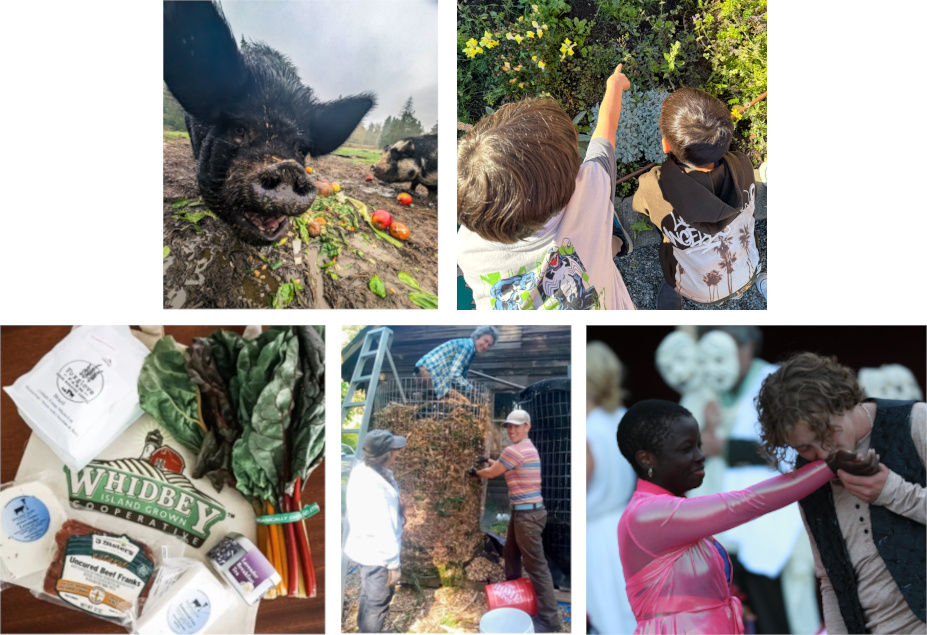Millennial Farms
- Dean Enell
- Apr 10, 2023
- 4 min read

Have you noticed what seems to be a sea change in demographics here on South Whidbey in recent years? That seemingly absent generation of twenty to thirty+ year olds has moved from obscurity to a welcomed prevalence in numbers around here. Wherever you find yourself, be it a grocery store, a stop light, a music event, a restaurant or brew pub, they’re sitting right next to you.
What happened and where did this previously absent generation of folks come
from?
Here’s my theory. For a large number of years we’ve prided ourselves on defining a ‘rural character’ image which we’ve managed (with some difficulty) to sustain around here. Such a vision is supported by prioritizing environmental and natural assets, open space, farms, forests and ready access to hiking trails, public beaches, kayaking, biking and other outdoor activities.
We’re also into agriculture. Sure we don’t have the best soils such a passion deserves, but we do have open spaces and an immense, nearby Puget Sound metropolis of 3 million or so food consumers.
So what brings these Millennials to Whidbey? I’m thinking because we are developing a large number of small, sustainable, low-impact farms on Whidbey. They’re generally started and nurtured by an intriguing collection of younger (certainly sub 40) individuals who are intensely devoted to their trade and generally have many connections to our community. They care about and influence things around here.

Take the Sweetwater Farm operated by Jake and Aja Stewart. Their 24 acre operation just off Cultus Bay Road is an impressive collection of farmland and forest land (agroforestry) with some affordable housing included. This family farmstead is described as permaculture-minded, always seeking sustainable farm practices employing a no-till regenerative agriculture process.

In Freeland, we have the Deep Harvest Farm operated by Annie Jesperson and Nathaniel Talbot. Nathaniel doubles as a very popular musician and Annie works on organizing the farm communities to foster support and influence within our local government.

What has really put us on the map of sustainable farming nationally is the heralded Organic Farm School down on Maxwelton Road. Their mission statement pretty much says it all: "Becoming a successful organic farmer today takes a wide variety of skills—from soil management and seed production to marketing and business planning". They are succeeding in spades at imparting those skills to people with a passion for farming throughout the country.
As Judy Feldman, the director and driving force says, "at the Organic Farm School, we give aspiring farmers a strong foundation in a broad range of skills so they can move toward their unique farm goals." The Farm School has a history dating back to the Greenbank Farm before moving to it’s current location on Maxwelton.
Located on Wahl Road in Freeland is the Nettle Forest Farm. This attractive farm operation claims “Our young farm is not a commercial enterprise. It doesn’t look like a commercial farm and we don’t intend for it to grow into one. Since the initial tilling of the little abandoned pasture in 2015, all the work to create the farm has been done with our own hands. Our vision has been for the property to remain wild, in spite of the undeniable change our presence has brought. And it is wild - not just on the edges - and this intention flows into the low-till, organic, and biodynamic inspired food we grow.”
At the SkyRoot Farm, Eli and Arwin have founded a certified organic farm which is moving towards a very low till/no till system. "Our tractor tiller has not been in the field in 2 years and we are still using a walk behind rototiller in a few places, but for the most part, reduced tillage has been our main focus. We’re using a lot of compost, some of which we are buying and the rest we are building." They publish a newsletter that is very useful to the farm community.

Also in Freeland, Foxtail Farm grows certified organic vegetables, fruits and flowers. It’s right next to the Deep Harvest Farm (above) and has a view to knock your socks off along with vegetables to whet your appetite.
Silver Tail Island Farm is located near the shopping center in Freeland and encourages folks to set up an appointment for viewing and tasting.
Eric and Britt Conn run Full Cycle Farm on a former Christmas tree farm and also now on a new property closer to Langley. "We are striving towards a local sustainable food system, working to produce food for the community in a whole systems way. We practice the ecological farming practices of companion planting, crop rotations, cover-cropping, and building compost." Eric also grows native tree seedlings for their annual free tree give-away to help reforest the land.
As you can see, there’s something going on here that is strongly influencing sustainable farm operations and that something is totally beneficial to our climate stressed environment. In my 30 years here, I’ve never witnessed such an explosion of regenerative food production. Such ventures truly complement our climate concerns on two fronts. One is mitigating climate change by reducing or sequestering carbon from our food production and distribution efforts. The second involves adapting to the effects of climate change by keeping food on the table when more extreme weather patterns develop within our CO2 intensified planet.



